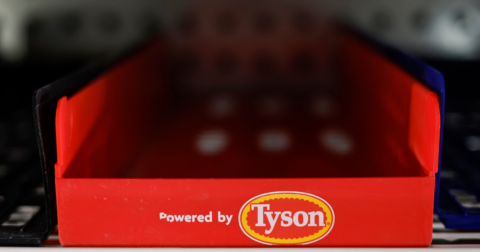Feature
Dairy and Meat Industries Push for Access to H-2A Farmworkers While the Trump Administration Slashes Their Pay
Policy•13 min read
News
Two recent cases may deter unfounded climate claims for meat.

News • Legal Action • Policy

Words by Sophie Kevany
America’s largest meat company, Tyson Foods, can no longer claim its beef is ‘climate-smart’ or that it will reach net-zero greenhouse gas emissions by 2050. In an out-of-court settlement to a lawsuit brought by the Environmental Working Group under consumer protection laws, the Arkansas-headquartered conglomerate agreed this week to stop making such claims, now and for the next five years, unless it can provide evidence proving the claims are true.
Tyson, which says it produces about 20 percent of America’s beef, pork and chicken under brand names including Jimmy Dean, Hillshire Farm, Wright Brand and State Fair, had been marketing a product called Brazen Beef, saying it came from a climate-smart beef program. Launched in early 2023 at the Annual Meat Conference in Dallas, Tyson said Brazen Beef would come from cattle that produced 10 percent less greenhouse gas emissions.
Tyson’s brazenmeats.com website is offline, and appears to have been offline for nearly a year. Similarly, Tyson’s sustainability.com website, a page it linked to when making claims it would reach net zero emissions by 2050, is also inactive.
The lawsuit against Tyson, which began in September last year, asked the Washington D.C. Superior Court to stop the world’s second largest meat company from making “false or misleading marketing claims” under the D.C. Consumer Protection Procedures Act.
The complaint against Tyson by the Environmental Working Group, a non-profit organization, focused on consumer rights, arguing that “Tyson knowingly capitalizes” on consumers who “want to purchase foods that do less harm to the environment,” but who cannot “independently determine which foods qualify.”
Caroline Leary, the Environmental Working Group’s general counsel, tells Sentient that Tyson’s settlement is a major win for consumers. “When major beef producers market their products as environmentally friendly without evidence to back it up, consumers are the ones to lose.” This case, she says, “is really about making sure people get truthful information, not just a market spin,” when they are trying to make sustainable choices about what to buy.
One third of all greenhouse gas emissions come from food production, with the bulk of those food-related emissions driven by beef. Research suggests that reductions in beef consumption are needed to bring down food-related climate emissions. Environmental advocates and researchers have argued that labeling any beef as climate-friendly could end up deterring from necessary climate action. Reporting also suggests that there was no evidence supplied by the company that backed up the emissions-reducing claims.
The legal complaint against Tyson further argues that the company “produces tremendous volumes of climate warming emissions at every stage of its industrial meat production process” but has “no plan to achieve these goals and is taking no meaningful steps to do so.” The result, the complaint says, is that Tyson’s “false or misleading advertisements and representations” violate the consumer protection act.
Tyson’s out-of-court settlement, dated November 13, was signed by Adam Deckinger, Tyson’s chief legal and administrative officer, and David M. Foster of global law firm Hogan Lovells. In the settlement, the meat producer said it “denies all allegations made by EWG and contends that it has invested significant resources into its pursuit of its Net Zero 2050 Ambition, including by investing over $65 million to reduce greenhouse gas emissions relating to its beef products.”
Nonetheless, the settlement agreement states that from November 13 , and for five years after that, Tyson will “neither make new nor repeat old Emissions Claims, unless and until” those claims are verified by an expert agreed upon by both parties. Tyson further agreed that it will “neither make new nor repeat old Climate Smart Beef Claims” and that it will not “market, sell, or promote” Brazen Beef in the U.S. for the next five years. The same restrictions apply to “any beef product described as ‘climate smart’ or ‘climate friendly,’ unless and until” those claims are validated by an expert.
The Tyson settlement follows similar legal action against Brazilian meat giant, JBS, taken by New York Attorney General, Letitia James. Earlier this month, James said JBS had agreed to pay $1.1 million to settle allegations it misled the public by promising to achieve net zero emissions by 2040.
Taken together, Leary told Sentient that the settlements “show that the era of unsubstantiated climate claims for major meat companies is coming to an end. The public deserves accuracy, and corporations of this size really have to be held to a higher standard. This is really what the case was about and what we achieved.”
The Tyson settlement also sends a much broader signal to food producers, as the food sector is a major source of emissions, particularly methane, she says. The message is that if it’s serious about tackling climate change, the sector must “address methane from beef production head on, not just with slogans or marketing.”
Public securities filings suggest that the company spends almost three times as much on advertising as it does on research. According to its 2023 10-K Tyson’s advertising expenses totaled $868 million in 2023, 2022 and 2021, while research and development costs totaled $336 million for the same years.
The message to Tyson, Leary adds, is one that should “make not just beef producers, but really any type of food company really think twice and make sure they have looked into the claims that they’re making and make sure they have facts to support it.”
A Tyson Foods spokesperson told Sentient by email that the company “has a long-held core value to serve as stewards of the land, animals and resources entrusted to our care,” and that the “decision to settle was made solely to avoid the expense and distraction of ongoing litigation and does not represent any admission of wrongdoing by Tyson Foods.”
Describing what real change might look like at Tyson, Leary says the company would need to produce “verified data showing that there’s real and measurable emission reductions across their beef supply. Not just pledges, not just offsets, not just pilot programs.”
The Tyson statement adds that it takes a “comprehensive and holistic approach to increasing operational efficiencies, identifying opportunities to reduce greenhouse gas emissions across the supply chain, and partnering with stakeholders to create a more resilient food system.”
Asked if she was surprised by Tyson’s settlement, given that current U.S. president, Donald Trump, has belittled climate change concerns and called it a “con job,” Leary says “regardless of what the administration is doing or saying, a lot of people care about climate change and people want to make choices that are better for the planet, but they can only do that when companies tell the truth.”